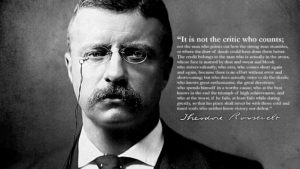Leadership
Passion gives ideas a life of their own
On Sunday last week, I found myself on a panel adjudicating business pitches presented by entrepreneurs from around South Africa.
They entered the Legends in the Making Competition and won the opportunity to attend a weekend entrepreneurship boot camp in Pretoria organised by Somafco Trust, a social enterprise focused on youth development.
I was intrigued to see young people, mostly from underprivileged backgrounds, following their dreams and committing to build businesses. It was truly courageous of them to stand up, speak their minds and receive a barrage of questions from a panel of adjudicators.
Such behaviour puts them leaps and bounds ahead of those who have not even started turning their ideas into reality.
I have been coaching people on effective presentations for many years – anything from personal talks to presentations for the boards of big businesses.
One thing that I have found time and again is that the majority of the preparation time is incorrectly allocated towards the content and technical details of the presentation, and the delivery is overlooked.
This is especially true for entrepreneurs because they are challenged to spend hours and hours preparing the best business case, forgetting that there is more to the pitch than the document itself.
Several studies have shown that the least important part of communication is what you say – that is, the content.
Most of it is driven by numerous nonverbal factors such as tone and body language.
There are three such factors that are critical but quite often missed during pitches: expressing passion for the idea; remaining authentic and being aware of your audience.
Passion is everything. In fact, it is contagious. The more passion an entrepreneur can exhibit for their idea, the more this passion is infused into the audience.
Passion needs to be present all the time, not just when talking to potential investors.
The same is true for conversations with potential customers, suppliers, mentors and even family members who may still have the outdated mindset that going into entrepreneurship is a “crazy idea”.
When I witnessed young people expressing their passions last weekend, I found myself with a growing level of hope that young South Africans have the willpower needed to solve the frustrations that our society has lived with for many generations – frustrations especially detrimental to townships and rural communities. They shared business ideas that could reduce inefficiencies in the public healthcare system, transportation and, most importantly, education.
Passion goes hand in hand with authenticity.
The very word “pitch” misleads us to believe that we should be performing a show of sorts. A plot to hide our true selves for a few minutes. This is a fallacy.
It is more important to present the most authentic version of ourselves. No mask.
When people are deciding whether it is worthwhile to build a long-term business relationship with us, financial or otherwise, they have to see who we really are.
It is not the document or the product they will be investing in. They will be investing in the individual.
Brené Brown is a research professor who is famous for studying vulnerability and authenticity. She delivered one of the most popular TED talks of all time. In her book Daring Greatly, she writes that entrepreneurship is by definition synonymous with vulnerability, and if we shut down vulnerability, we shut down opportunity. She says we need to be able to tell the story of who we are with our whole hearts.
It’s critical to pitch from the heart. This is how we build connections with other human beings.
We need to have the courage to share our true stories, and be vulnerable enough to admit what we do not know.
I have learnt with time how to be authentic and vulnerable when I present to an audience. It can be difficult to expose your true self to others. But these are the moments when I feel most human. They are the moments I feel most connected to my audience.
Pitching is also about listening intently and remaining aware of the audience. Learning about the interests of the audience ahead of time empowers us to communicate in a manner that resonates well with the listener.
Listening gives us the chance to notice what the audience is passionate about and thus connect with them authentically on it.
When someone takes the time to talk to us about our business ideas, it means they want to create a win-win situation for us both.
I am not advocating for people to focus solely on the triad of passion, authenticity and awareness. It goes without saying that it is similarly important to get the basics right about the market, the competitive landscape and how your business will make money.
However, this triad of factors can help entrepreneurs set themselves up for greater success and lasting business relationships.
Advancing women into senior leadership positions is everyone’s responsibility
The burden of increasing female representation in senior positions needs to stop being a women-only agenda – in the same manner that topics affecting minority groups are erroneously assigned to individuals from those groups instead of the majority groups that are in a position of influence.
In business, the main decision-making power still primarily rests with men. Research shows that less than 5% of businesses globally are led by women, and women fill less than 25% of senior leadership positions. That means the views and decision-making at the top remain biased towards one gender.
Merely empowering women to own the “women” agenda is not really helping anyone as those women are not in the position of influence needed to effect impactful change. Worse, in the instances where there is that one woman who has managed to break through the supposed glass ceiling, she is burdened with the responsibility of carrying the women agenda for everyone else and taking on the responsibility of mentoring and coaching all the women below her, even though men are just as capable of carrying this burden.
This is unfair in many ways, and we have to start shifting our thinking on this women agenda. As the primary decision-makers, it is the men in the boardrooms who need to be tasked with this responsibility – not the outlier executive already overburdened with the high volume of responsibility placed on her by the women looking up to her.
Instead of putting her in a tough position where she has to mentor as many women as she can, why not let the men carry the weight? After all, they, too, have wisdom on how to make it to the top.
Men quite easily take on mentoring other men. They identify the guys they like, spend quality time with them, sponsor them and position them in line for the next promotion. They seldom do this for women. There are many reasons for this, including the awkwardness that comes with giving female employees special attention – all kinds of gossip and misinterpretations can follow on from that. Men would rather have drinks or a meal with a male colleague, at which most of the mentoring happens, than risk being seen doing the same with a female colleague.
This indirectly leads to the exclusion of women, intentionally or not. Men need to think about how to effectively change their views on this, even if it starts with proactively giving women the same mentorship-type attention that they do with men. That way, no one is excluded merely on the basis of gender.
Men should also proactively take responsibility for encouraging those who look up to them to remain their authentic selves as they grow into leadership positions, otherwise we will end up with a situation where the women successfully move up, only to arrive at the top and realise they have been pretending to be men the whole time.
Human beings see and do. Women see mostly male leaders and unconsciously decide that this must be the way of leading. It is often not. We all have our own unique ways of leading that make us effective.
The male leaders in the majority should be encouraging women to appreciate and thrive from that which makes them unique.
One day, when we get a seat at the table, we will have a female perspective in the room. Then we can start reaping the benefits of gender diversity in senior leadership positions.
Studies show that companies with female representation in leadership, however minimal it may be, outperform those that do not. This occurs because these women bring a new, refreshing voice into the room. That is how you get quality and better position your organisation to outperform its peers.
The women representation agenda is one for which we are all responsible, especially those of us who are in leadership positions and have the power and influence needed to change the numbers at the top.
We should not be doing this just because it makes sense for equality – it also makes simple business sense. Diverse teams are far more effective than homogeneous teams.
The power of servant leadership
I was driving through one of the low-income neighbourhoods on the outskirts of Durban recently. There had been heavy rains that had led to significant flooding.
When approaching an area of the road that was completely flooded, I noticed a group of boys and young men busy filling it with sand so that cars could drive through.
They did this selflessly, despite the rain and lack of financial incentive. That kind of proactive action stood to benefit the overall community.
They were applying the idea of servant leadership – when people take actions that will benefit their community. In this environment, everyone applies whatever skills they have towards the benefit of others.
This kind of leadership has thrived in some of our communities for decades.
It is exactly what was demonstrated by the youth of 1976, when they took collective action to stand up against oppression.
To this day, many remain surprised that people so young were capable of collectively working together to achieve such a defining moment in our history.
During Youth Month, the nation honours them with various youth-focused celebrations and activities.
I hope we also take a moment to ask ourselves if our actions today are significant enough to honour the legacy of those who lost their lives in 1976.
Forty years later, they would be our parents and grandparents – looking back on the impact of their leadership.
I wonder if we are really continuing to apply the legacy of servant leadership that they left behind for us.
I ask this because I notice a shift towards a more individualistic approach to leadership, especially in terms of how we conduct ourselves in the world of business.
We focus on what “my business and I” can gain, instead of the value that my business can add to the community it operates in.
When you apply the concept of servant leadership, you could expand your own potential because your goals are no longer limited to the needs of one individual – they expand to the needs of the entire community: where your business operates, where your suppliers operate, where your customers live and even where your employees live.
As long as our scope of impact includes stakeholders with varying interests, our scopes become bigger, our vision for ourselves and the potential we could have become even greater.
Putting the needs of our communities first might help us build businesses that can achieve more than buying a BMW and branded apparel
This kind of leadership can lead us to build ventures that have the potential to go way beyond what is imaginable – as was true for the youth of 1976. The impact of their actions has lived on for much longer than any of those young individuals could have ever anticipated.
I worry about the individualistic mindsets we are adopting.
Archbishop Emeritus Desmond Tutu labelled this correctly in the article he wrote in the Sunday Times last week, when he was commenting on this shift towards individualism, instead of collective benefit.
Referring to the actions of the youth of 1976, he wrote, “They did it completely selflessly: with no thought of tenders, fancy cars and clothing, or securing jobs for their cousins … They did it because it was right. And they did it together.”
If we try to emulate the values that the youth demonstrated 40 years ago, we will soon realise our communities have much to gain from our skills. How we choose to get involved in our communities will soon move beyond corporate social responsibility and social impact, and more towards incorporating the needs of our communities into broader visions.
Putting the needs of our communities first might help us build businesses that can achieve more than buying a BMW and branded apparel.
It will enable us to build businesses that will create enough wealth to develop lasting economic potential for our communities and create much-needed job opportunities.
That is the impact we could have as soon as we shift away from self-interests.
This is not a call to the youth. This is a call to any member of society who has a skill to deploy. After all, the leaders of tomorrow, the children of today, tend to emulate the behaviour of those they look up to in their day-to-day lives.
Let us learn something from the youth of 1976 and show the world that those protesting individuals, including the young people who died on June 16, would be proud of how we are leading the nation today.
Behind every successful man, is …
 A joke doing the rounds on the internet is that while Michelle and Barack Obama were at a simple restaurant, the owner requested a private conversation with the first lady.
A joke doing the rounds on the internet is that while Michelle and Barack Obama were at a simple restaurant, the owner requested a private conversation with the first lady.
On her return to the table, Michelle told her husband that she and the restaurant owner had been in a relationship during her teens. To which the president responded: “So if you had married him, you would now be the owner of this lovely restaurant.” Michelle replied: “No. If I had married him, he would now be the president of the US.”
Like many jokes, this reflects a view held by many: that Michelle has had a commendable impact on Barack’ s success as the first black president of the US.
Numerous presidents and leaders around the world are confirmation of the axiom “Behind every great man is a great woman”.
But Michelle Obama consistently stands out as an American first lady who has gained a tremendous following and respect around the world.
I believe the respect and admiration she has won is the result of her ability to build a powerful personal brand.
This is something that we can all learn from, especially women. In the spirit of Women’s Month, let’s remember the notable local and international women who have proved that building a powerful personal brand is not something reserved just for men. Women can also have strong brands and can reap the resulting benefits.
When people describe Michelle, the words most often used are “powerful”, “confident” and “integrity”. This is thanks to the efforts she has made to be consistent in the way she portrays herself – from public appearances, to the content of her speeches and the kinds of career choices she makes.
The lesson for anyone building a personal brand in the context of business is that the strength of your brand relies on your ability to consistently live up to the qualities your brand stands for – whether it be in public or in your private life.
It is much easier to be consistent when the brand is authentic to who you are. So often we see our leaders in business and in politics being embarrassed by the scandals that emerge about them – scandals that are utterly inconsistent with the public images that they try to portray.
A personal brand is not a marketing idea of who you hope to be: it is a representation of who you are.
The second key element of Michelle’s brand is that she did not become a shadow of herself in an effort to help or stand by her husband. In fact, both she and the president have benefited from her maintaining the outwardly powerful presence that she consistently portrays.
In the past, the words “powerful” and “confident” would traditionally not be associated with women next to the men at the top, even though manyof us know that the presence of these women plays a key role in the men’s success.
For example, the fact that Hillary Clinton is the presidential candidate for the Democratic Party in the USis a testament to her leadership abilities. One can assume that these same abilities were critical to the success of husband Bill’s election campaign and his presidency.
But few would have credited her with these skills back then, because her image was of a supportive first lady, not the competent presidential candidate we see today.
Women may not be holding all the top seats in business either, but there are a number of them behind successful male CEOs.
In the past, the norm may have been to lie low and remain in the shadow of the men leading us. But it is time we started encouraging the opposite behaviour.
America’s first lady has proved that this approach canbe beneficial, not detrimental, to the brands of everyone involved.
This mentality is reaffirmed by the wise words of Marianne Williamson in her book A Return to Love: Reflections on the Principles of A Course in Miracles: “Our deepest fear is not that we are inadequate. Our deepest fear is that we are powerful beyond measure … There is nothing enlightened about shrinking so that other people will not feel insecure around you.”
Let us all start reaping the benefits that come with letting our power be known.
There is no shame in displaying your power in a manner that is true to your feminine nature. Michelle Obama’s brand is both powerful and feminine.
We live in a world where power is often associated with masculine behaviours. This first lady has shown us that you can indeed build a brand respected for its power, while being authentically feminine at the same time.
In her own words: “One of the lessons that I grew up with was to always stay true to yourself.”
Try giving, not taking, when you do networking
Networking events have become an everyday custom in business. It is a no-brainer that who you know is more important than what you know. As a result, most people aspire to become good at networking because it has become an enabler for success in the world of business.
It can be the one thing that helps you land that killer promotion or raises funds for a new business.
At networking events, the “serial” networkers are often seen moving from one person to the next, keeping the conversations short and handing out business cards to everyone they meet.
Most people will speak to another party just long enough to gauge whether there is something they stand to gain from them. If there isn’t an identifiable benefit, they swiftly move on to the next person. They build connections only if there is something to be gained.
This approach to networking is not only distasteful but outdated.
Successful networking should be about what you can give, not what you can get from others. This approach is more effective in establishing healthy, long-lasting networking relationships.
The moment we shift our mindsets from what we stand to gain to what we stand to give, the networking experience becomes completely different. We listen more attentively and remain aware of the value that we can add to someone’s life or business, instead of purely what they can do for us.
When we eventually take their contact details, it is not because we hope to use them for something that we need – it is because we hope to add value to them. The relationship is established on the backbone of value creation, not one-sided exploitation.
You might end up with fewer business cards , but the quality of the relationships you stand to build is much higher. That is because reciprocity is part of the human psyche – eventually, people do give back to those who add value to them.
This approach to networking makes it easier for others to refer you or recommend you to others because they can speak from a personal experience of when you added value to them. They speak more confidently about you from first-hand experience. People are far less likely to put their reputations on the line for someone they cannot personally vouch for.
Networking relationships that begin from a value-creation base are better positioned for long-term success because of the genuineness of the interest in building the relationship – unlike the self-interested networking relationships we commonly build today.
This is especially important for the success of a new venture because entrepreneurs are constantly in search of help from others – potential suppliers, customers, partners, investors and employees.
Unfortunately, when entrepreneurs go to networking events, they end up investing too much time trying to identify the people who can help them instead of showcasing the value others could gain from the entrepreneur or their new venture.
We are often encouraged to put ourselves out there and woo others into giving us the help we need to succeed.
This can be daunting for most people. However, if we reframe this and put ourselves out there because we want to find opportunities to add value to others, the task becomes far less daunting.
When I first came across networkers who were genuinely interested in giving rather than taking, it felt strange. This is mainly because we live in a world where we become suspicious of others when they are being kind to us.
When I overcome this initial scepticism and invest in the relationship, I find these connections much healthier than the relationships built on the basis of the traditional approach to networking.
There is an old saying about friendship which goes: “When I went outside to find friends, I could not find one. When I went outside to be a friend, friends were everywhere.” This is similarly true in the world of networking.
It begins with being prepared to genuinely add value to the lives of other people.
| 2016/09/25 |
SUNDAY TIMES OPINION BY ZIPHO SIKHAKHANE, 2016-09-25
Bridge skills gap to ready yourself for the top job
People are constantly in a race to make it to the top. We have been brainwashed to believe that ultimate success is about making it to the next level as fast as possible.
Companies reaffirm this way of thinking by promoting high performers while having limited regard for whether the person’s current role has prepared them for the senior ones that follow – roles which may require a different skill set.
This approach worked for a long time and made sense in the past when it took many years to get to the top. Companies banked on the fact that, at some point, the person would eventually acquire the skills needed to succeed in a big role.
This is not always true, especially if you look at the world of politics, where success tends to be influenced more by years of commitment to the political party and the relationships built over time than whether you have the skills to lead the party.
The traditional approach to promoting people is far less appropriate today because people are promoted faster and while much younger.
Studies show the average age of CEOs continues to decrease. The main challenge with this is that there is a higher risk of having CEOs and senior executives who have critical skills gaps and could make mistakes that would not be typical for someone at their level.
And the price for these mistakes can be high the higher the person is in the organisation.
The mistake is not in promoting people with limited years of work experience. It is important to infuse the kinds of leaders who can bring fresh, creative and innovative ideas to a changing world. The mistake is not empowering those leaders with the skills to succeed in the big role.
Notice my emphasis on skills acquisition, rather than years of experience.
The solution to this is not to revert to the old-school model of promoting people based on the number of years they have stuck around.
Leaders today need to challenge themselves in acquiring the skills needed to be ready for the bigger position.
We need to stop the cycle of wanting to climb higher without regard for how we are going to address our skills gap when we get there.
Organisations and their HR departments have an even bigger responsibility because they need to lead this mindset shift. They need to encourage and celebrate leaders who develop a wide variety of important management skills as much as they value climbing up the ladder.
It should not be an anomaly when someone prefers to shift to the same level in another department in order to learn new skills; this should be the norm for those who aspire to make it to the top.
There is a reason that companies such as GE are so successful at consistently developing leaders of CEO calibre. It is one of the few companies in the world that can claim to have created a high volume of successful CEOs and executives.
It achieves this by making sure that its fast-tracked development plan involves exposing its leaders to a variety of roles, functions and skills. Even though this happens in a short period, its leaders become successful because they are developed in a holistic way. They have fewer gaps in their management skills profile.
This approach is sometimes referred to as “horizontal development”, where individuals value developing adjacent skills that will help when they reach that big position.
This mindset shift is going to be tricky, especially among the current generation of millennials who have not been shown the value of using horizontal development.
Not addressing this is the reason that many young start-up company founders end up having to step down mainly because they were great at developing an innovative idea, in a small company, with a small team.
Steve Jobs of Apple, Andrew Mason of Groupon and Mike Lazaridis of BlackBerry are famous examples. Running a bigger venture requires a different skill set.
This mindset shift has big implications for young high performers because they are constantly being promoted, only to wake up one day, look back and realise all the growth areas they missed along the way.
This article was first published in the Business Times on 18 September 2016
Work not just to earn, but to learn widely
I recently revisited a set of childhood parables on financial independence written by Robert Kiyosaki and Sharon Lechter in the bestselling book Rich Dad Poor Dad. I remain intrigued that, almost 20 years after its initial publication and worldwide success, the majority of the book’s simple and relevant insights remain widely underutilised.
Even though many of us aspire to achieve wealth and financial independence, few of us choose the path that could get us there, such as owning a business or making strategic investments. As a result, our economy continues to suffer from low levels of entrepreneurship and high levels of unemployment.
Our society continues to define getting a job as a sign of success, when jobs should be seen as a means to an end, not the final destination. In fact, we should be choosing to be in a job because we want to learn certain skills that will help us become better multigenerational wealth creators.
This requires a complete mindset shift from the old mentality of choosing jobs based on what we stand to earn. Instead, we must focus on what we stand to learn. Many of us shy away from following through with our entrepreneurial aspirations because of a perceived lack of skills needed to get the job done.
As a result, we end up spending the rest of our lives in salaried jobs, momentarily excited by the next promotion or raise, instead of using the time as an opportunity to learn the skills needed to create our own wealth.
Income gained from a salaried job is often limited to a fraction of the value that you add to a business each day. In contrast, there is no limit to the income you can extract from utilising the skills acquired from a typical job. The value of skills can be timeless.
This mindset shift from money received to skills gained can be the game-changer that will increase the consistently low levels of entrepreneurship in this country – an important lever for addressing the unemployment challenge.
As a passionate investor in up-and-coming African entrepreneurs, I have noticed that spending time obtaining relevant skills can help reduce the anxiety that comes when entrepreneurs take the leap to start their own businesses.
The transition from a job to self-employment is far easier with the right tools in hand. For example, entrepreneurs are often required to be all-rounders and must be especially skilled at understanding and managing business finances.
Almost all companies have an accounting and finance function, but few people outside this department actively go there and ask to learn. Being in close proximity to people with complementary skills can present ample opportunity to learn from them.
Sadly, we live in a world where people are hardly ever taught about finances unless they are affiliated with the accounting profession. This should be a core part of the school curriculum.
If you are serious about your entrepreneurial aspirations yet have no clue how to manage money, you should use your time in the corporate world to learn how to do so from your peers. The same is true for human resources, or any of the other functions necessary to help a new business owner succeed.
There is a reason aspiring CEOs are often put on rotation programmes that allow them to work with the different functions of the company. This is because anyone running a business needs to have a decent understanding of all the departments they oversee. As an entrepreneur, you will similarly be responsible for all of these functions in your own business.
I am conscious of the upcoming internship and holiday work season, when many unemployed young people get opportunities for part-time jobs.
Let us encourage our young people to get out of the mentality of choosing these jobs based on their income potential. Instead, they must start choosing part-time jobs based on what they stand to gain in terms of skills and exposure.
They will soon realise that what they stand to learn from some part-time jobs far outweighs the potential salary.
At the very least, they will gain the work experience most employers seek. At the most, they will gain the skills they need to create their own wealth, become their own bosses and create plenty of job opportunities for others.
Authenticity is heartbeat of leadership
Often when people think about what it will take to grow into the next level of leadership, they consider what they would need to change about themselves so they can appear to be ready for their next role.
Instead of focusing on growing our skills, often we end up suppressing parts of our personalities so that we can give the impression we are better aligned to an image of what we believe a leader is supposed to be.
But this is an image that is normally inconsistent with our authentic selves.
This can be difficult to maintain, especially in an era where the gap between your personal and professional life is becoming steadily narrower – so much so that it has become common practice for recruiters to check candidates’ online profiles before deciding whether to hire or promote a person. Some people even change their names on social media to avoid having their employers discover who they really are.
We all know that our true characters eventually come out, so why bother trying to pretend in the first place?
It is exhausting to live your life in an inauthentic way. This has led to many of the scandals we see today – when the true characters of leaders in politics and business are finally revealed.
I strongly urge all of us to start applying a more genuine approach towards how we lead.
Authentic leadership is about understanding that, as a leader, you are only able to operate at your best when you are being genuine, not when you are pretending to be someone else. No one wants to be led by a false persona we have created when we are called on to lead.
Authentic leaders are individuals who behave consistently, regardless of the circumstances.
This makes them easier to trust and depend on, because their behaviour is always aligned with their values.
Their passion permeates their environments because they are not pretending. They also build better relationships with their teams because being genuine leads to healthier connections with others.
We do not have to look far to find a good example of an authentic leader.
Advocate Thuli Madonsela, who is leaving office this week as public protector, has made a mark that will be remembered for a long time.
She achieved this by being clear about the values she stood for, and demonstrated these values through her behaviour. Despite the hurdles encountered along the way, she remained passionate and stayed true to her value system.
These kinds of leaders make it easier for others to follow them, and for the nation to depend on them.
At the other end of the scale, you get a character like Donald Trump, the businessman and US Republican Party presidential candidate.
We need to be led by leaders who can inspire others by consistently remaining true to who they authentically are
People are surprised by the scandals that continue to come out about him – even though these events are consistent with the image he has portrayed to the American people. People are shocked because we are used to public figures who suppress parts of their character that are inconsistent with our image of them, or the image they wish to portray.
It is time we accepted that authenticity trumps suppression.
And it would be far worse if Trump pretended to be someone else, only to reveal his real nature one day should he occupy the Oval Office.
Authenticity in leadership can be difficult to grasp for today’s leaders. When I train leaders on this, I often hear them say “What if others are not comfortable with who I really am?”, or “What if I do not fit in?”
By no means am I saying that being consistently authentic comes without difficulty – especially in a world where some still believe this to be an unconventional way of leading.
I just believe that at some point we have to stop conforming to ways of being that are inconsistent with our values and lead to the suppression of our passions.
The same holds true for entrepreneurs: their DNA normally becomes embedded in the organisations that they build.
Even though many disagreed with Steve Jobs’ leadership style, the majority of his success was because he led by being true to who he was. As a result, his legacy has lasted beyond his time.
Entrepreneurs cannot sell a strong and powerful vision effectively if it is inconsistent with their own passions and values.
Imagine how difficult it would be to persuade others to buy products that do not resonate with you. Everyone is building apps these days because it is considered “cool” – not necessarily because the creators are passionate about them.
We need to be led by leaders who can inspire others by consistently remaining true to who they authentically are.
The man in the arena: Be a bold supporter, not a critic
 ‘It is not the critic who counts; not the man who points out how the strong man stumbles, or where the doer of deeds could have done them better. The credit belongs to the man who is actually in the arena …” These are the unforgettable word
‘It is not the critic who counts; not the man who points out how the strong man stumbles, or where the doer of deeds could have done them better. The credit belongs to the man who is actually in the arena …” These are the unforgettable word
s uttered by US president Theodore Roosevelt in 1910, a little more than a decade after America had emerged as a new world power.
He wanted to emphasise that the success of a country rests on the quality of its leaders and the discipline of its citizens, as opposed to the distracting commentary of others.
There is a reason that his words are still referred to in presidential speeches and literature. Nelson Mandela, whose passing we commemorated this week, gave a copy of Roosevelt’s words to the captain of the South African rugby team, Francois Pienaar, just before the team proceeded to beat the All Blacks in the 1995 Rugby World Cup final. US President Barack Obama referenced Roosevelt’s words this year in a speech he delivered during the run-up to the presidential elections.
Roosevelt’s words are a reminder that the person who deserves our respect, admiration and encouragement is the man in the arena – the person taking notable strides towards making South Africa a better place, and not necessarily the critic commenting from the sidelines.
Despite the tough economic environment, we have seen a number of politicians, business leaders and members of broader society take bold actions that have helped keep our economy stable and retain its investment-grade status. They achieved this despite judgment and criticism. Sometimes their actions were risky and unconventional – they were being the man in the arena – but their quality in character and discipline in action helped them to persevere until the desired outcome was achieved.
There is still a long way to go in the mission to revive growth and restore confidence across the country. We need more people to act as supporters and encouragers, so that more people can feel comfortable with being the bold man in the arena.
As we look to the year ahead, each of us should choose whether we want to be critics or supporters who encourage others to go out and take bold actions. I hope most of us opt for the latter, otherwise we will be remembered as the country that had great potential but struggled to support those who had the willpower to unleash that potential.
The more we can shift towards a more supportive and encouraging society, the more people will feel encouraged to take the big leaps they would otherwise not take.
As an example, one of the key levers for growth in this country is the development of small, micro and medium-sized enterprises. We are in dire need of more citizens to participate in that space, yet too few are bold enough to take the leap towards developing their small businesses. They are hindered by the fear of being judged by the critics should they fail.
Imagine how different the outcome would be if those critics actually turned into the supporters you need to start and develop a solid business – from funders, mentors and customers to suppliers. There would be much more development in this space, and more small businesses would prosper.
The fact that you are not yet ready to start and grow your own business, or lack the desire to do it, does not mean you cannot play a role in supporting those who are ready to do so. We each have the ability to help small businesses in different ways. We have to, given their significance to the development of our country’s economic growth plan.
Roosevelt emphasised that the person he referred to as the man in the arena is someone “who spends himself in a worthy cause; who at the best knows in the end the triumph of high achievement, and who at the worst, if he fails, at least fails while daring greatly”. Our fear of failure tends to drive us away from taking action, but if we focus on daring greatly and taking action despite the fear, we might just find ourselves in a triumph of high achievement.
Don’t overlook the wisdom all around us
The global market economy is facing a tough time, with billions of dollars lost this week alone – and the local market is following suit.
The outlook is negative and some economies are preparing for another crisis. This does not provide an inspiring environment for someone looking to start or grow a business.
Something could be wrong with how we have been running big business. Perhaps entrepreneurs will need to look for inspiration elsewhere. The enthusiastic optimist in me is eager to find different, unconventional sources of inspiration.
Myles Munroe, a prominent author and life coach, once said: “The wealthiest places in the world are not the diamond mines in South Africa or the banks of the world … In the cemetery is buried the greatest treasure of untapped potential.”
In contrast, I wonder if we can seek inspiration from the wisdom that is around us but often overlooked.
Dr Miles Munroe and wife Image: Myles Munroe International Facebook
Surely we can be inspired by the behaviour of the women and children in our lives – people whose key behavioural traits have been historically marginalised or undervalued.
In the ’40s, Carl Gustav Jung was the first analytical psychologist to introduce the idea of female and male consciousness, anima and animus. He claimed that all beings naturally possess both levels of consciousness. However, the feminine traits remain largely suppressed. This is worrying because, he found, creativity stems from the feminine traits of spontaneity, emotion and intuition.
If entrepreneurs suppress these natural creative abilities, they run the risk of not using something that is critical during the business start-up phase. We are missing out on a chance to use half of our potential.
One of my all-time dreams in life was to meet Oprah Winfrey, one of the most influential women in the world. When I did, I was surprised to realise that a woman as powerful as she is still abounds with the very essence of “anima” – intuitive, spontaneous, humble. She was vulnerable enough to admit to not knowing all the answers and instead admired others for bringing brilliant questions to the table.
Entrepreneurship needs the humility to acknowledge when we do not know the answer; it needs to allow mentors and peers to drive the creative process.
Bestselling books on business and entrepreneurship talk about how women need to be more like men to succeed, and how showing feminine qualities can hinder success. I look forward to the day when we start reading more books on how women (and the rest of the world) can embrace their innate feminine strengths.
A similar case can be made for children. The “marshmallow challenge” experiment showed that preschool children were among the fastest groups to build the tallest marshmallow tower using just spaghetti sticks. They played, collaborated and completed the task on time, and with decorations. The adults planned, argued and even cheated, but could not complete the task on time.
We all know that we are most free, honest and playful when we are young. This open-minded mindset can propel a culture of innovation and creativity in a new business.
Beyond the behavioural traits of women and children, there are also the traits of the poor. They are the best implementers of the survivalist mindset. This is the mindset that most big businesses are operating under today – one that is critical when an entrepreneur needs to allocate limited resources to a wide set of activities.
I was raised by a Mother Teresa-type character who somehow mastered the art of allocating limited resources across a large group of people. She consistently ensured the nourishment of the family, despite a meagre wage.
Psychology studies repeatedly show that the poorest communities are happier than wealthy communities. They live relatively simple, meaningful lives, with strong social connections.
It is much easier to entrench these values of simplicity, purpose and community in the earlier stages of an organisation’s development than later on. Changing the habits of an established organisation can be much harder.
Albert Einstein, one of the greatest creative geniuses of all time, once said that we can’t solve problems by using the same kind of thinking we used when we created them.
As we establish the businesses of the future, it is worthwhile to seek inspiration from unconventional sources. This will hopefully help us get out of our current predicament.
Inspiration is all around us, we just need to open up to it.






Leave a Reply